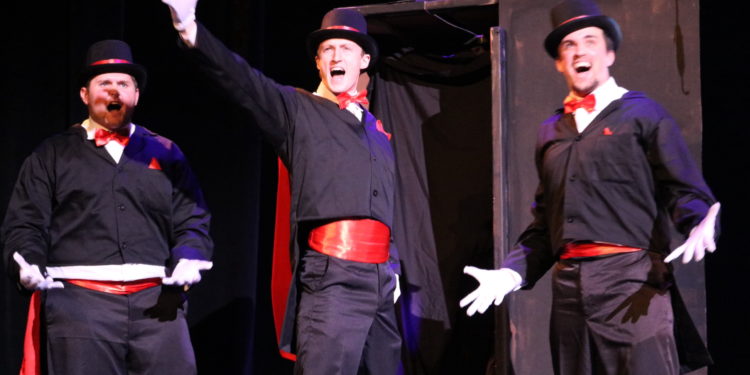18 days. That’s how much time there is between Banner Drop on Jan. 8 and the first Step Sing Show on Jan. 26. Only 18 days.
Only 18 days to squeeze in rehearsals outside of class and work and life. Only 18 days to memorize sheet music and vocal harmonies and formations and choreography. Only 18 days to turn groups of around 70 Samford students into teams ready to perform in front of thousands of eager spectators.
It’s a miracle that any Step Sing group pulls itself together at all, but it’s a miracle that Samford students enjoy pulling off every year.
Each Step Sing group clings to their secrets, preferring to shroud their movements in mystery until the big event. But this secrecy applies to more than just the show themes and song lists, it also applies to what transpires behind the closed doors of rehearsal spaces.
After all, it is a competition, and in the words of Pi Kappa Phi Director Davis Ennis, “We can’t tell you all of our rehearsal secrets because they’re trade secrets that we pass down, but there’s a method to the madness that we have.”
With so many Step Sing groups operating in secret separately from one another, each group has developed their own rehearsal style. What one group claims is the most important part of practice, another may not pay much attention to.
For example, the one aspect of performance that many groups prioritize from day one is character work. Both Chi Omega and Alpha Delta Pi used different games to help participants get into character for the show.
In one of Chi Omega’s earliest rehearsals, the participants lined up and did their best rendition of a classic zombie walk while the directors called out different categories like running zombie, hungry zombie and crawling zombie, while participants did their best to stumble and sway like a zombie down the practice floor.
“Obviously, our character isn’t human, so we really wanted to work on embodying our character and being a zombie,” Chi Omega participant Anna Baldwin said. “It was really fun. We got to cheer each other on and practice being a zombie, which has been really helpful because you have to be in character for all five minutes (of your show).”
Alpha Delta Pi had similar character exercises, with sorority sisters tasked with staying in character and dancing to a changing playlist. Participant Marley Estornell emphasized the importance of these games for teaching participants to stay in character.
“They play all different types of music because throughout your show your music changes, but you have to still remain in character, so it’s important to be able to practice the character with whatever song comes on,” Estornell said. “But it’s still just a time where everyone is laughing and having fun. It’s a good way to start rehearsals.”
But while Chi Omega and Alpha Delta Pi create special exercises for character work, Pi Kappa Phi lets their participants gradually develop their characters over time, letting each member capitalize special moments and make the show their own. For Pi Kapp, the focus is on interacting with the audience and entertaining the crowd.
“At the end of the day, if your show is not entertaining, then what are you doing?” Ennis said. “Your dancing and your singing should be on the back burner. It’s more about interacting with the people in front of you and making sure they’re having a good time.”
Pi Kapp always starts by exclusively focusing on vocals for their first couple rehearsals. Once they feel like they have mastered the music, they graduate to practicing formations and learning choreography. They like to start with the music, so the only vocal work they do at subsequent rehearsals is their warm up song of “mommy made me mash my M&Ms.”
Although the Pi Kapp directors admitted to having lots of fun at rehearsals, Director Wesley Parker claimed that as the performances draw near, the participants naturally dial in and take the competition more seriously.
“We find that it gets more fun the more serious we take it,” Parker said. “You can goof off, but if you take it seriously and it’s good, that’s way more fun.”
Pi Kapp Director Jonah Wetsel claims that the desire to win motivates their participants and that each successful practice run of their show fires the fraternity brothers up even more.
“Most of us have never done theatre before,” Wetsel said. “None of us inherently care about singing and dancing or anything like that, but we like to win and see the people around us win. And because we have this pre-established respect and friendship, we can push each other in every aspect.”
No matter what a group focuses on during rehearsals, it’s during those late hours of sweat and hard work that relationships are formed. Rehearsals are where groups learn to sing, step and work together towards a common goal. Participants start those 18 days as individuals in a group but end them as a family.

Editor-in-Chief





